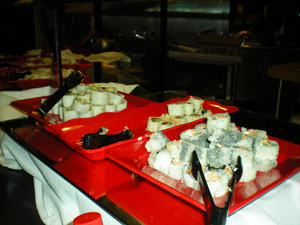Dining Services: Catering to student tastes over time
As Washington and Lee students change, so do their food preferences
Feb. 21, 2011
Students at Washington and Lee University celebrated the Lunar New Year last week with Asian cuisine and festivities. Entrees included Thai curry shrimp, stir fry and rice, and sushi, prepared by the dining services staff. Asian-themed decorations transformed the marketplace, and music set the mood as students enjoyed their cultural meals.
 Sushi offered at Washington and Lee's Lunar New Year Dinner. Photo by Katy Stewart |
Lunar New Year dinner is one of several big initiatives that dining services puts on. Students look forward to other dining events, like Fall Harvest dinner, an award-winning event begun in 2007 as a way to highlight local organic food, and Thanksgiving dinner, which has been a culinary tradition at W&L for decades. Assistant Manager Kelly Brown said, “coming up with new ideas for special theme dinners keeps the food fun, challenging & creative.”
On a day-to-day basis, dining services has to meet students’ wants and needs alike, in all the different dining venues on campus. Dining Services coordinates the meals for the Marketplace, Café ’77, Hillel House, sorority dining, and special events catering in Evans Dining Hall. Brown, who has been with dining services for 22 years, said the biggest change she has seen is diversity-related food preferences. As W&L’s student body becomes more diverse, so do their favorite foods.
Dining services now offers more options for students with dietary restrictions, like gluten-free, lactose-intolerant, vegan, or vegetarian. “We advertise and speak directly with students with dietary needs to keep them posted of options,” Brown said.
Brown says that the most popular items among students are classic dishes, like grilled chicken, risotto bar, turkey burgers, mozzarella sticks, and chicken tortilla soup. Least favorites are boca burgers, pork chops, shrimp scampi, and tofu dogs.
The D-Hall over time
Ben Cummings, W&L undergraduate and law alum (’67, ’70) and W&L dad (of Alex Cummings, ’13), said that of the meal offerings, roast beef was the favorite meal, and mystery meat was the least. He said that meals were served cafeteria-style in Evans Dining Hall, but there were far fewer options then than there are today.
Cummings said that besides Thanksgiving dinner, he doesn’t remember any special events, other than the occasional food fight, although food tended to taste better on Parents Weekend, he said.
After freshman year, Cummings ate in his fraternity house, where a cook made cooked-to-order breakfasts for the men, and offered dinners like fried chicken, meatloaf, spaghetti, and lasagna.
He also said that students who lived off campus would sometimes purchase mealplans at the Southern Inn restaurant in town, where students would pay for a month of dinners and receive a punch card to keep track. Students liked the Greek and Italian options that were “good and cheap,” he said.
Beyond the taste preferences of students, dining services has advanced Washington and Lee’s motto, “not unmindful of the future,” with environmentally green initiatives. In 2007, the Virginia Department of Environmental Quality recognized dining services as a Virginia Green Facility. This involves the recycling of glass and other items, elimination of Styrofoam and disposables, overall waste reduction, grease recycling, water efficiency, and energy conservation. Dining services also uses local, organic foods when available, and has a composting program with the Biology department.

| Regional events calendar |
Local government websites: |
Produced by Washington and Lee digital journalism students.
![]()




